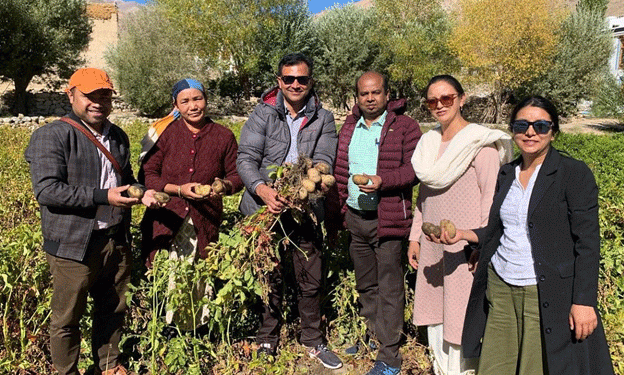The high-altitude region of Leh district, Ladakh, is home to a unique community of tribal farmers who face extreme climatic conditions that often limit their agricultural productivity. Recognizing these challenges, the ICAR-Central Potato Research Institute (CPRI), in collaboration with ICAR-Krishi Vigyan Kendra, Leh, launched a demonstration program from September 30th to October 1st, 2024, showcasing improved potato varieties specifically suited for the region.
Potatoes are a staple crop for many in this cold desert, but local varieties often fail to reach optimal yields. This demonstration program introduced improved varieties like Kufri Himalini, Kufri Karan, Kufri Chandramukhi, and Kufri Jyoti. Through field trials conducted in seven villages, these varieties showed significant promise for increasing yields and incomes in Ladakh’s high-altitude environment.
Yield Data:
The most impressive performer during the trials was Kufri Himalini, which yielded around 34-36 tons per hectare, more than doubling the output of the traditional local variety, which only managed about 18 tons per hectare. Other improved varieties, such as Kufri Karan and Kufri Chandramukhi, also performed well, yielding approximately 28-30 tons per hectare, while Kufri Jyoti reached 23-25 tons per hectare.
These numbers represent a significant breakthrough for farmers in the region. The yield improvement has direct implications for income generation, with Kufri Himalini alone providing twice the income compared to the local variety. Additionally, farmers praised the new variety’s shape, storage life, and overall quality, which make it not only a high-yielding option but also more marketable.
Practical Support and Solutions
During the 2-day program, scientists interacted with local farmers to discuss challenges such as seed availability, storage techniques, and the region’s short growing season. They provided practical solutions, including better crop management practices, the importance of seed quality, and the use of organic fertilizers to enhance soil health.
The program also introduced Good Agricultural Practices (GAPs) for sustainable potato cultivation, focusing on disease management, irrigation techniques, and post-harvest handling to reduce crop losses. The data collected from the trials was shared with the District Agriculture Department, with the goal of scaling up these improved varieties across the region.
Moving Towards a Potato Seed Village
In an exciting development, Likir village in Leh district has been earmarked for further collaboration between ICAR-CPRI and the local agriculture department. The vision is to transform Likir into a potato seed village, where quality seed potatoes can be produced not only for local use but also for distribution to other parts of Ladakh. This initiative is expected to enhance the region’s self-sufficiency in potato seed production and contribute to the wider potato value chain in India.
The introduction of ICAR-CPRI-improved potato varieties, especially Kufri Himalini, has demonstrated the potential to significantly boost productivity and income for tribal farmers in Leh district. The success of these varieties, combined with ongoing scientific support, points toward a more resilient agricultural future in Ladakh, one that can withstand the challenges of high-altitude farming while providing economic stability to local communities.







